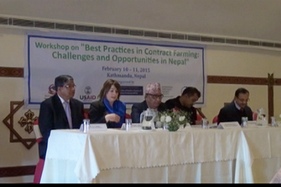Konark Sikka is an intern with IFPRI- South Asia office

Participants at the workshop in Nepal
Agriculture being major source of livelihood and employment in Nepal, and is effected by low productivity, traditional farming practice and lack of connectivity with markets. Fragmented landholding with limited access to market and knowledge to sell its produce results in slow progress. Promotion of contract farming would lead to improved access to technology, markets and credit, reducing transaction costs and increasing efficiency in production and marketing. This would enable small scale enterprises to mitigate risks while creating a climate for entrepreneurship. Contract farming in fact has the potential to reduce poverty by raising farmers’ incomes.
International Food Policy Research Institute (IFPRI) in collaboration with the Ministry of Agricultural Development, Government of Nepal, and Institute for Integrated Development Studies (IIDS), and Federation of the Nepal Chambers of Commerce and Industries (FNCCI), organized a two day workshop on ‘Best Practices in Contract Farming: Challenges and Opportunities in Nepal’ on 10-11 February 2015 in Kathmandu, Nepal.
The workshop uncovered that scaling up contract farming was necessary but it would pose challenges which would need to be overcome through collective action to ensure smallholders’ participation. This might even require intervention from the government, relevant NGOs and lead firms in value chains, thus posing a need for solid communication and cooperation between the three sectors. Mutual trust would be needed for fortifying any relation between contractors and contracted farmers. With that in mind, risk sharing between the two would facilitate the fortification of this relationship. Integrating research institutions into the process would be fruitful as well, as it would help in a faster and smooth spread of technologies.
Sharing country experience at the workshop – Few of the policy way forward that were discussed are-
1. There is a need to be a convergences of policies, institutions, technologies and infrastructure
2. Policies and an impermeable legal framework pertaining to contract farming is needed to be developed and there should be reduction in policy lag, between announcements and actual implementation
3. Leveling the playing field for private sector participation in the form of regulations, taxes and solid incentives for the agri-business industry is needed
4. Involving smallholders into growers associations and providing them with credit and insurance would be step forward
5. Improving public infrastructure along with a proper technology transfer mechanism as solutions needs to be initiated
This workshop is part of the on-going project Policy Research and Strategy Support for Agricultural Development and Food Security in Nepal


